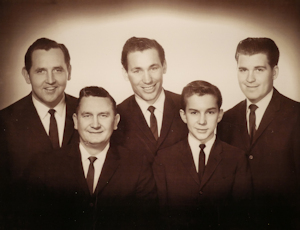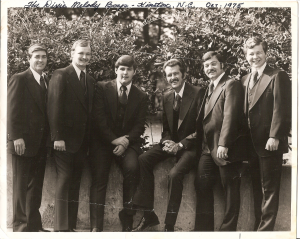|
Dixe Melody Boys, 1979 |
Group Members(Partial List) |
 Dixe Melody Boys in the 1960s before Ed O'Neal joined (left to right on back row) Marvin Harris, Ralph Walker, Gene Payne (left to right on front row) Avis Adkins and Tony Brown |
 Dixe Melody Boys, 1975 |
Dixie Melody Boys (1962-2023)
Awards
Singing News Fan Awards:
Horizon Group (1988)
History
The modern Dixie Melody Boys began in the spring of 1962, but they weren't the very first group to employ the name.
An earlier Dixie Melody Boys had been associated with the Stamps-Baxter songbook company around 1950 in Oklahoma City, Oklahoma. One lineup of that group included Asbury Adkins (tenor), Clovis Simpkins (lead), Marvin Garrett (baritone), Clarence "Tiny" Thompson (bass/manager), and Carlos Day (pianist). Adkins, Simpkins, and Day had performed together previously in Huntington, WV, and were all hired at the same time by Thompson. This Dixie Melody Boys relocated to Wichita Falls, Texas, but Asbury Adkins had to leave the group when he was drafted in 1951.
After Asbury Adkins completed his military service, he contacted Tiny Thompson to secure permission to launch a new Dixie Melody Boys. The new group consisted of Asbury Adkins (tenor), Bill Nelson (lead), Clovis Simpkins (baritone), Jim Terry (bass) and Johnny Bruce (pianist). Simpkins left after a short time and Homer Fry became the baritone. This early version of the Dixie Melody Boys dissolved in 1957. Both Asbury Adkins and Homer Fry landed with the Gospel Harmony Boys.
Around 1961/1962, Avis Adkins, a distant cousin of Asbury Adkins who was raised in the same rural area of Wayne County, WV as Asbury, was managing a group called the Helmsmen. He reached out to Asbury and secured permission to rebrand the Helmsmen as the Dixie Melody Boys. Members of the group around this time included Ralph Walker (tenor), Avis Adkins (lead), Gene Payne (baritone), Marvin Harris (bass), and a young teenager named Tony Brown (pianist). Brown went on to play with JD Sumner And The Stamps Quartet and later became a record producer in Nashville where he was responsible for the success of some of the biggest stars in Country music.
Bass singer Ed O'Neal arrived in the mid-1960s initially to "fill in" at the bass position, a story he has relayed many times from the stage. O'Neal eventually purchased the group and relocated them to Kinston, North Carolina. The group had success initially as a regional group. In 1970, O'Neal attended the National Quartet Convention as a fan in Memphis, Tennessee and noticed the event included an amateur stage where up-and-coming talent was allowed to perform a couple of songs for exposure. He took his Dixie Melody Boys to NQC the following year, the first year it was held in Nashville, Tennesse. This expanded their reach and helped the group transition to full-time.
The Dixie Melody Boys had success with their 1978 album Sending Up Some Boards. Then in 1982, the group's song "Antioch Church Choir" reached the number one position on the Singing News monthly airplay chart.
By the mid-1980s, O'Neal was looking to reach a younger audience. The group recorded two albums branded as DMB Band that featured a distinct Country Gospel sound that many have since said was about ten years ahead of its time. By 1988, the Dixie Melody Boys name was revived and the group's sound reverted to traditional Southern Gospel. Their album released that year was not coincidentally titled Back Home and featured a combination of voices that included Derrick Boyd (tenor), McCray Dove (lead), and Nathan Widener (baritone) along with O'Neal. Dove would remain with the Dixie Melody Boys for the next ten years, after which he formed the Dove Brothers.
O'Neal remained active with the Dixie Melody Boys through most of the 2010s (over 50 years). He retired from traveling in 2019 due to health issues and hired Will Lane initially and then Earl Roberts to sing bass.
On March 14, 2023, Ed O'Neal announced that the Dixie Melody Boys were officially retired.
Ed O'Neal University
Singer/songwriter Rodney Griffin who has spent the bulk of his career with Greater Vision is just one of many who got his start with the Dixie Melody Boys. It was Griffin who came up with the concept of "Ed O'Neal University (EOU)." The term refers to the fact that many talented individuals got their initial exposure and first-hand training singing with Ed O'Neal as part of the Dixie Melody Boys before going on to perform full-time with other major groups. A few of these include Harold Reed (Kingsmen/Florida Boys), Ernie Haase (Cathedrals/Ernie Haase & Signature Sound), Devin McGlamery (Karen Peck & New River/Ernie Haase & Signature Sound), Mike Rogers (Brian Free & Assurance), Derrick Selph (Brian Free & Assurance), and Dustin Sweatman (Mark Trammell Quartet).
Discography
Due to the large number of projects recorded by the Dixie Melody Boys, the discography section has been divided into separate pages by decade. Please click on one of the links below to access the decade you wish to view.
1960s 1970s 1980s 1990s 2000s 2010s
